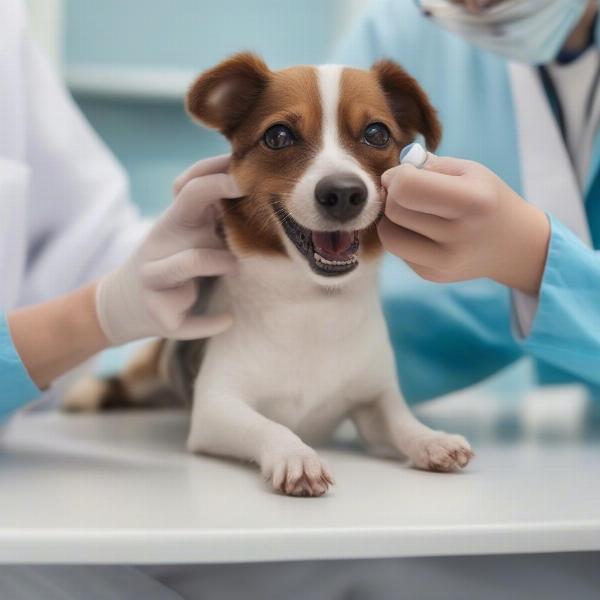Dental fresh for dogs is crucial for their overall health and well-being. Just like humans, dogs can suffer from dental diseases that can lead to pain, bad breath, and even more serious health issues. This guide will explore the importance of fresh dental care for dogs, covering various aspects from daily brushing to professional cleaning. We’ll discuss different methods, products, and tips to help you keep your dog’s teeth clean and their breath fresh.
Understanding the Importance of Fresh Breath for Dogs
Bad breath in dogs isn’t just unpleasant; it can be a sign of underlying dental problems. Plaque and tartar buildup can lead to gingivitis, periodontal disease, and even tooth loss. These conditions can cause pain and discomfort for your dog, making it difficult for them to eat and enjoy their food. Moreover, dental infections can spread to other parts of the body, affecting organs like the heart, liver, and kidneys. Therefore, maintaining fresh dental hygiene for your dog is essential for their overall health and longevity.
Effective Methods for Maintaining Fresh Dental Hygiene
There are several ways to keep your dog’s teeth clean and breath fresh. Daily brushing is the most effective method. Use a dog-specific toothbrush and toothpaste, as human toothpaste can be harmful to dogs. Start slowly and make it a positive experience by rewarding your dog with treats.
Besides brushing, dental chews and treats can also help. Look for products that have the Veterinary Oral Health Council (VOHC) seal of approval. These products have been tested and proven to be effective in reducing plaque and tartar buildup.
Professional Dental Cleaning: When is it Necessary?
While regular home care is essential, professional dental cleaning is sometimes necessary. Your veterinarian can assess your dog’s dental health and recommend professional cleaning when necessary. This procedure usually involves general anesthesia and allows for a thorough cleaning and examination of the teeth and gums.
Choosing the Right Products for Fresh Dental Care
Selecting the right products can be overwhelming with so many options available. Look for fresh dental for dogs products specifically designed for canine use. Consider your dog’s age, size, and breed when choosing a toothbrush and toothpaste. For dental chews, himalayan yak chew for dogs can be a good option. Always consult with your veterinarian for recommendations tailored to your dog’s specific needs.
Addressing Common Dental Issues in Dogs
Some breeds are more prone to dental issues than others. Small breeds, for example, often have overcrowded teeth, making them more susceptible to plaque and tartar buildup. Regular checkups and proper dental care are particularly important for these breeds.
 Small Dog Dental Checkup
Small Dog Dental Checkup
Dr. Emily Carter, DVM, a renowned veterinary dentist, emphasizes, “Early intervention is key to preventing serious dental problems. Regular brushing and checkups can save your dog from pain and discomfort in the long run.”
Dental Care for Senior Dogs
Senior dogs often require special attention when it comes to dental care. They may have weakened teeth and gums, making them more susceptible to infections. Be gentle when brushing their teeth and choose softer dental chews. Regular veterinary checkups are crucial for monitoring their dental health and addressing any age-related issues.
Dr. Michael Davies, DVM, another respected veterinarian, adds, “For senior dogs, maintaining good oral hygiene can significantly improve their quality of life. It allows them to eat comfortably and enjoy their golden years.”
Conclusion
Fresh dental care for dogs is a vital aspect of their overall health and well-being. From daily brushing to professional cleaning and using products like deodorant dog, every step contributes to maintaining their oral hygiene and preventing dental diseases. By following the tips and advice in this guide, you can ensure that your dog maintains fresh breath and healthy teeth for years to come. Remember to consult with your veterinarian for personalized recommendations and regular checkups.
FAQ
- How often should I brush my dog’s teeth? Ideally, daily brushing is recommended.
- What kind of toothpaste should I use for my dog? Use toothpaste specifically formulated for dogs. Never use human toothpaste.
- Are dental chews effective? Yes, dental chews can help reduce plaque and tartar buildup. Look for VOHC-approved products.
- When should I take my dog for a professional dental cleaning? Consult with your veterinarian to determine the appropriate frequency.
- How can I tell if my dog has dental problems? Bad breath, red or swollen gums, difficulty eating, and excessive drooling can be signs of dental problems.
- Can dental problems affect my dog’s overall health? Yes, dental infections can spread to other parts of the body and affect vital organs.
- Are there any special considerations for senior dogs? Senior dogs may require gentler brushing and softer dental chews.
Related Articles
About ILM Dog
ILM Dog (https://ilmdog.com) is your trusted resource for all things dog-related. We provide expert guidance on dog breeds, health and medical care, training and behavior, nutrition, grooming, exercise, puppy care, senior dog care, traveling with dogs, and product reviews. We strive to empower dog owners with the knowledge and resources they need to provide the best possible care for their furry companions. Whether you’re looking for advice on choosing the right breed, understanding canine health issues, or finding the perfect dental care products, ILM Dog is here to help. Contact us for personalized support at [email protected] or +44 20-3965-8624.